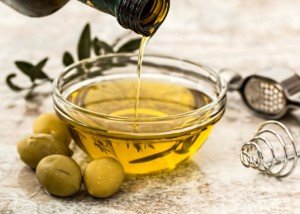Want to prevent stroke? Include olive oil in your diet; dip bread in it and enjoy, and so many other ways to use this versatile “healthy fat.”
Stroke can leave your body permanently maimed; do whatever it takes to help prevent this cruel No. 1 cause of disability in the U.S.
Olive oil is linked to significantly lower risk of stroke in older people. (online Neurology, June 15, 2011).
Fight Stroke with a Good Fat
Prajakta Apte, RDN, owner and founder of Right Nutrition Works who helps people create a healthier lifestyle, offers the following tips on how to include olive oil into your diet as part of stroke prevention.
• Use olive oil as marinades or as a base for sauces and gravies for meat, poultry and fish.
• Sauté or roast your vegetables in olive oil.
• Olive oil can be a great alternative to butter and margarine to dip your breads.
• Drizzle flavored olive oils such as lemon olive oil, orange olive oil or grapefruit olive oil on salads.
• Olive oil can be used as a salad dressing as well.
• Drizzle over cooked pasta and spaghetti.
“Our research suggests that a new set of dietary recommendations should be issued to prevent stroke in people 65 and older,” says lead study author, Cecilia Samieri, PhD, in the Neurology report.
“Stroke is so common in older people and olive oil would be an inexpensive and easy way to help prevent it.”
- Every year in America, 800,000 people suffer a stroke.
- Stroke is the third leading cause of disease-driven deaths.
Three More Tips on Using Olive Oil
- You may already know that adding olive oil to the water that you cook rice and pasta in will not impose upon the taste.
- One part olive oil to one part vinegar will make a tasty salad dressing.
- Another way to eat olive oil is to add a tablespoon to a fruit smoothie. You will not even detect it’s there.
More About the Stroke Study
For the French study, the records of 7,625 people, who had no stroke history, were reviewed.
There were three groups:
1) no olive oil use
2) moderate use: such as in cooking, or with bread or as a dressing, or
3) intensive use: olive oil for both cooking and with bread or as a dressing.
After about five years, 148 strokes occurred. People in group #3 had a 41 percent lower stroke risk, compared to people in group #1.
Other variables that affect stroke risk, such as body mass index, exercise habits and overall diet, were adjusted for in this study.
So could this mean that olive oil has a direct effect on a person’s risk of stroke, or could there be some indirect effect going on?
Whether the issue was cause-and-effect, or indirectly, is not clear. And to this day, it is not clear, either.
For example, if you smoke, have uncontrolled high blood pressure, never exercise and are obese — olive oil isn’t going to save you from a stroke.
However, using olive oil can increase consumption of other healthy foods by making them tastier, and this increased consumption of more healthy foods will lower stroke risk.
The Calories in Olive Oil
If you’re concerned about calories and weight gain, then cut back or eliminate the gravies and sugary sodas; replace French fries with boiled potatoes; fried potato chips with baked; fried fish with broiled; and big fast-food cheeseburgers with tuna and chicken salad sandwiches.











































